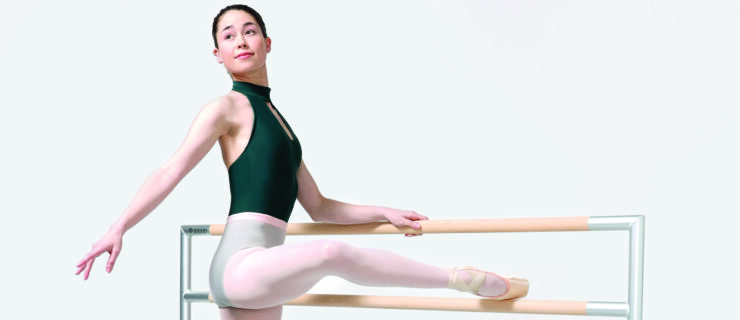Balancing Act: Avoid First-Year College Pitfalls
As a freshman at Point Park University in Pittsburgh, PA, Laura* was overwhelmed by college dance life almost from day one. “I saw girls from so many different dance backgrounds, and I felt that mine wasn’t good enough—that I wasn’t good enough,” she says. “I became preoccupied with changing the way I looked. I experimented with not eating, throwing up and taking different diet pills.”
Soon Laura’s rocky emotional state and her eating issues began to affect her dancing, her grades and her social life. “I could not perform well,” she says. “I lost strength and technique. I even lost the desire to dance.”
She hid her problems from others for months, and eventually transferred to the University of Wisconsin–Madison, about 45 minutes away from her parents’ house. She took six months off from dance to take academic courses and determine if she wanted to continue pursuing a dance major at her new school.
At UW, Laura made friends who weren’t dancers and gained perspective on life outside of dance. She eventually finished her dance degree, and though she continued struggling with insecurity and body image issues throughout college, she now had her family, a therapist and a host of supportive friends around her, which helped her get healthy.
Laura’s case may be extreme, but the emotions that started her downward spiral are common. Beginning college is both exciting and scary. You’re upping the ante on your dance training by taking more classes each week, and you’re dancing alongside hordes of talented peers (plus you’re being graded!). Add the issues that every new college student faces—being away from home, taking challenging academic courses, making new friends—and you’re bound to feel a little overwhelmed.
Here, DS looks at five aspects of college life that can hinder dancers trying to adjust to a higher-ed lifestyle. Remember: It’s normal to need time to settle in when you start school, but going to extremes in any of these departments may eventually keep you from living the balanced, fun, healthy life you envisioned for yourself when you first set out for college.
Body Issues
Try not to compare yourself to your new classmates—it can send you into workout overload. Just ask Jeremy McQueen, a dancer who’s now touring with Wicked. He adopted an extreme exercise routine when he started college at The Boston Conservatory, and his habits followed him throughout his freshman year, even after he transferred to The Ailey School in NYC. “I was introduced to dancers who were as talented as me, if not better,” McQueen says. “Being only 5 feet 7 inches tall, I felt pressure to be even better physically than the other males, because my height was already an issue in getting roles. I tried various exercises to get the body I wanted: Bikram yoga, Pilates, Gyrotonic, floor barre and finally going to the gym to use the stationary bike, the elliptical machine and the treadmill.”
Soon, McQueen found himself getting up at 5 am each day for a hard-core workout before his first class at 8:30, after which he bounced between dance classes, academic classes at Fordham University and rehearsals until at least 9 pm. “Because I didn’t know when or how to listen to my body, I often found myself over-stretching muscles or working them inadequately,” he says. “I sustained ankle injuries, shin splints and knee problems.” McQueen eventually went to faculty members for advice, and thanks to guidance from his teachers and an anatomy and kinesiology course his sophomore year, he began to find a balance between staying in peak shape and taking care of his body. When you arrive at school, take a cue from McQueen and ask faculty members for cross-training tips—they’ll be able to assess whether you need Pilates or yoga, cardio twice a week or to take up swimming in the campus pool.
Food Fights
College means taking charge of your own eating habits, and your schedule may make it difficult to squeeze in “normal,” well-balanced meals. “Our students dance all day long, so they need to be organized and bring food with them,” says Cherylyn Lavagnino, chair of the dance department at New York University’s Tisch School of the Arts. Use your meal plan money wisely by searching the cafeteria for healthy items you can take with you to eat throughout your day. (Read “Dining Hall Takeout” on p. 92 for some ideas.)
Everyone’s heard of the dreaded “freshman 15,” and often, fatty cafeteria food and pre-paid meal plans are to blame for this infamous weight gain. If you can, go grocery shopping and keep healthy foods in your room to supplement cafeteria fare. Be smart about your mealtime and snack choices, and try not to eat late at night—even if you’re up late studying.
Be aware of any emotional eating habits you have, to stave off stress-related weight gain or loss. If you have trouble controlling your eating habits, consider speaking with a counselor or nutritionist, so they can help you get on track.
Academic Angst
In college, dance is academic—you’re not just training your body, you’re training your mind. You’ll be required to take general courses on top of your dance classes. How do you balance it all, without staying up so late every night that you’re asleep at the barre every morning? “Be organized,” says Linda Hamilton, PhD, wellness consultant at The Ailey School and New York City Ballet. “That means looking over what’s going to be expected of you and figuring out when you need to get each task done.”
Examine all your syllabi and compare workloads and due dates for big papers and projects. Make a master calendar and add your non-class dance responsibilities—rehearsals, auditions and performances. It may be overwhelming to look at everything you have to do, but it will be easier in the long run if you know what’s coming.
Planning ahead means you can take time to breathe and actually enjoy your college experience. “If you space out your work, you can fit in breaks during the day,” Hamilton says. “It’s vital to schedule in down time to do something that’s enjoyable and not goal-oriented.”
Social Stress
Your non-dance classmates are goofing off or going out, but you’re stuck in the studio. When you aren’t dancing, you’re catching up on homework. Can you be a dedicated dance major and still have a social life? Of course!
Start by befriending your fellow dancers—you’ll have your busy schedules and love for dance in common. And don’t just stick to people your own age: Upperclassmen can guide you through your first year. But make social plans outside of dance time, and include non-dancers, as well. “Dance is collaborative by its very nature. You want to know the people you’re working with,” says Karen Schupp, a senior lecturer at Arizona State University. “But you still need balance. Go out and see a movie, and spend time with other people.”
Your social network will function as a safety net if you’re struggling. “Finding someone you can talk to is really important,” says Laura. “Your feelings are valid, and you need someone to confide in. When I didn’t have that, or pushed it away, that’s when things got difficult. I couldn’t do it all on my own.” Just remember that while friends are vital to your emotional health, they can’t solve every problem. If you feel like you’re truly floundering, be sure to talk to a trusted adult, like a faculty member or counselor. Don’t keep it to yourself.
Party Pressure
Going out, by itself, isn’t a problem. And if you’re over 21, neither is alcohol. But if you spend too much time at parties or drink excessively, it may interfere with your dancing. If you start regularly missing classes or rehearsals, or see the physical effects of alcohol consumption and sleep deprivation—often as weight gain and fatigue—you might be in trouble.
Consider designating a few “going out” nights, for instance Fridays and Saturdays, and reserving the other nights for homework and resting. If you know you have to get up and dance the next day, give yourself a curfew. You’ll still get to have fun, but you’ll regret it less the next day.
Of course, it’s easy to get carried away when others are going overboard—and even easier when you’re overwhelmed or upset. “Instead of talking to someone, students may engage in high-risk behaviors,” Hamilton says. Such was the case for Sarah*, who struggled emotionally when an injury sidelined her from ballet for almost a year at Indiana University. “While I was injured, I had a lot of time to experience [non-dance] college life,” she says. “I broke up with my boyfriend and started spending more time at bars than in the classroom, staying up until 4 am and sleeping until 2 pm. It was fun, but I also felt lost.”
Once she healed, Sarah worked hard to get back into top dancing shape. “I returned to my normal sleeping schedule, reconnected with friends I hadn’t talked to all semester and made straight A’s,” she says. “Ballet gave structure to my college life.” Sarah graduated with honors and is now a member of Las Vegas Contemporary Dance Theater.
Making the Most of It
“The experience, knowledge and connections you gain in college are just as important as your dance training,” Sarah says. The life skills college teaches you—time management, self-discipline, organization, healthy living—will also serve you well in a professional dance career.
For the most fulfilling college experience, try to find middle ground between dance, academic pursuits, social relationships and quiet time, and understand that what needs the most attention may differ from day to day. College is a balancing act for everyone, and though as a dancer you might have more to juggle than your peers, you’re also lucky to be studying what you love.
As Sarah points out, “Once you enter college or a conservatory, you have a limited amount of time there. You might as well soak up everything.”
Dining Hall Takeout
Go shopping in the school cafeteria for healthy items you can eat on the go.
Add these foods to your dining hall shopping list:
[ ] Fresh fruit (apples, oranges, bananas)
[ ] Fresh veggies (carrot sticks, broccoli florets and other portable items)
[ ] Whole-grain bread, deli meats and other fixings for sandwiches
[ ] Individual-serving yogurt containers
[ ] Dry cereal or granola



